 FILM
FILM In Which Our Heart Fills Up Like A Balloon That's About To Burst
 Friday, November 11, 2011 at 10:51AM
Friday, November 11, 2011 at 10:51AM 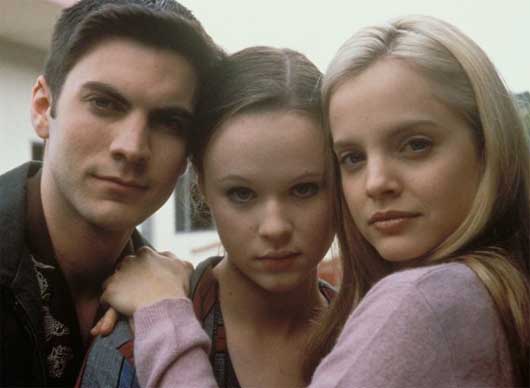
The Soft Animal
by ELENA SCHILDER
American Beauty
dir. Sam Mendes
92 minutes
A few days ago I stopped at the St. Mark's Bookshop and bought a collection of Mary Oliver poems. I was trying to give myself the gift of therapy. I wanted to be told, "You only have to let the soft animal of your body love what it loves." That's good advice. In House of Light, I found a poem I really like, not so directly therapeutic as the well-known "Wild Geese", but a little funnier, and still affirming, called "The Gift." In the poem, Oliver tells a story about listening to a bird's song, hearing Mahler in the song, and bringing “a machine" (a boombox, as I picture it) out to the bird so she can play it some Mahler. The last line of the poem is, "And mostly, I’m grateful that I take this world so seriously."
It is characteristic of American beauty, lower-case, to be profoundly confused about how seriously it takes the world, and, inversely, how seriously the world should take it. In 1999's American Beauty, Wes Bentley’s character, Ricky, asks Thora Birch’s character, Jane, whether she wants to see “the most beautiful thing” he has ever filmed. Together, they watch a plastic bag float among autumn leaves; they watch on a huge flat-screen in his decked-out bedroom.
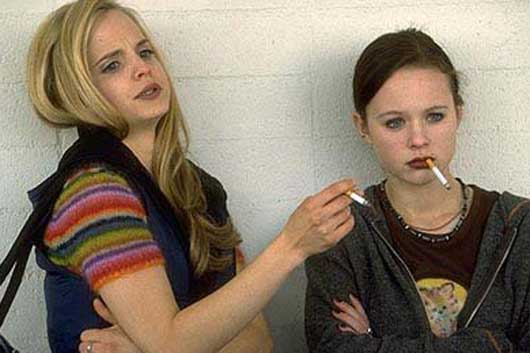
Reliving the moment of seeing and capturing the bag’s beauty, Ricky almost weeps. "That’s when I realized," he says, "that there was an entire life behind things." Ricky, as Jane is learning, gets a real spiritual kick out of things that most people find repulsive: a homeless woman, frozen to death; a dead bird lying at the feet of his true love. Ricky is not like other people. He claims no direct influences, sees the hidden beauty in things. He is grateful that he takes this world so seriously.
The late 1990s were a time at which the culture felt particularly comfortable diagnosing itself. The Clinton years had proved that everybody was libidinous and money-grubbing, but we had yet to learn to feel protective in the face of criticism and attack. America was perfecting the art of self-effacement: as all handsome losers know, the right joke at the right time, at one's own expense, can really charm the ladies.
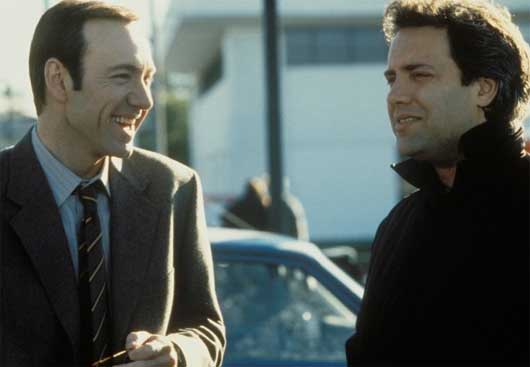 Kevin Spacey and Alan BallAmerican Beauty is a product of the same charming loser — Hollywood — that brought us, in 1999, Being John Malkovich and Fight Club. Like those movies, it is dandy and a flirt, posing as a cynic. In high school I thought American Beauty was, you know, beautiful. And it is: the production values here are so high, and the cinematography so accomplished, that even a plastic bag floating in the wind looks really, really good.
Kevin Spacey and Alan BallAmerican Beauty is a product of the same charming loser — Hollywood — that brought us, in 1999, Being John Malkovich and Fight Club. Like those movies, it is dandy and a flirt, posing as a cynic. In high school I thought American Beauty was, you know, beautiful. And it is: the production values here are so high, and the cinematography so accomplished, that even a plastic bag floating in the wind looks really, really good.
People were fond of saying that American Beauty was a "black comedy," since Fargo and other dark films had established a precedent for that kind of thing, and since it will, at moments, make a similar kind of joke about the depressing and routine nature of suburban existence. But what is in other, truer satires absurd and bleak, becomes in American Beauty the foliage floating, necessary but unnoticed, around the plastic bag at the heart of it all. That Kevin Spacey delivers his lines with some ironical flourish, and that, in the end, he dies, does not make this Death of a Salesman. Indeed, it is more Field of Dreams or It’s a Wonderful Life — a thorough genre mash-up, a ride up and down the ladder of success, a list of clichés.
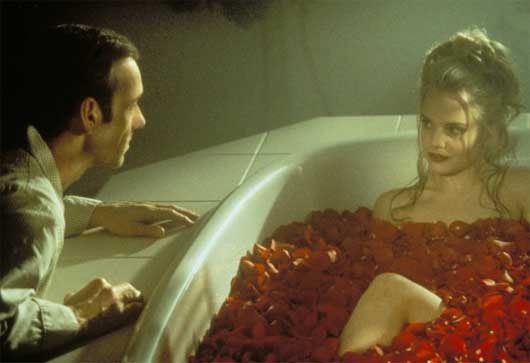
The ambiguity of what American Beauty is going for is more apparent now that it has aged a little bit. "My wife and daughter both think that I'm this gigantic loser," says Lester Burnham, "and they’re right. I have lost something. But it’s never too late to get it back." In Hollywood, when five to one hundred talented people throw all their energy at a single problem — how best to affirm America's sense of itself — what comes out is often both sentimental and, subtly, unhinged. And it is difficult to measure the seriousness of their multi-million dollar efforts: how, for example, should we evaluate the cultural impact of a movie like Forrest Gump?
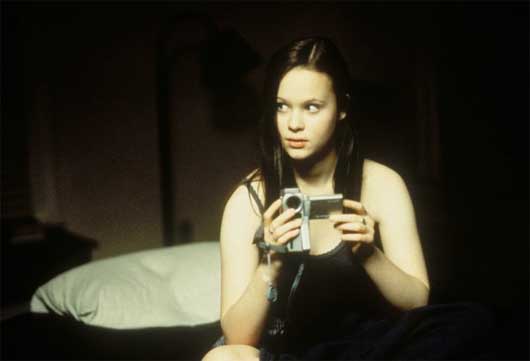
Fortunately or unfortunately, American Beauty is iconic. Mena Suvari will be frozen in that web of red rose petals forever. When I got an iPhone in 2009, the “Xylophone” ringtone reminded me of the American Beauty score, and it still does. The actors inhabit the metaphors of their characters very precisely, and this is — Ricky would agree, I think — beautiful. I do not object to cliché as an instrument in storytelling; storytelling, obviously, cannot escape cliché. Stories that drawn on clichés as widely and schizophrenically as American Beauty indicate, I think, the depth of American hunger — for that moment when, in hearing a bird’s song, or filming a dead bird, you transcend your ordinariness.
American Beauty is an arrogant movie. Like any other creature too satisfied with itself, it stops being fun after a while. It sates certain appetites, like the appetite to look at a perfect bowl of oranges while telling yourself that you don't really need or want a perfect bowl of oranges in your own house. When I imagined writing something about the film, I assumed there would be something funny to say. I had forgotten its seriousness.
Elena Schilder is the senior contributor to This Recording. She is a writer living in New York. She tumbls here. You can find an archive of her writing on This Recording here.
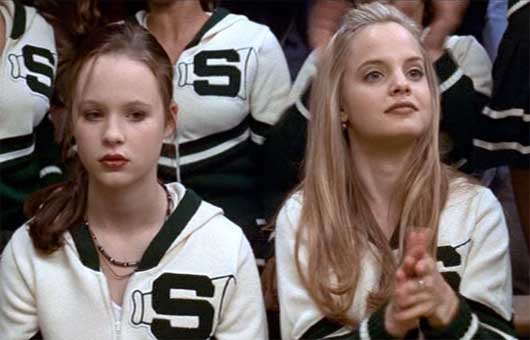
"8 November" - Amatorski (mp3)
"Peaceful" - Amatorski (mp3)
"Cheapest Soundtrack" - Amatorski (mp3)
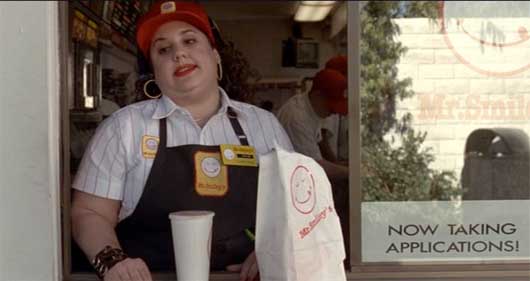
 alan ball,
alan ball,  elena schilder,
elena schilder,  kevin spacey,
kevin spacey,  sam mendes
sam mendes 




























